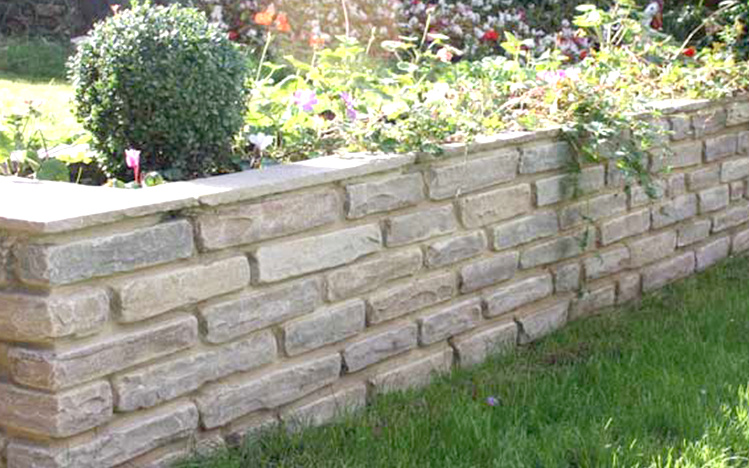Garden walling is a versatile and practical way of adding structure and definition to your outdoor space. Whether you want to create raised beds, set up a boundary around your garden, add a feature wall, enhance your privacy, divide areas of the garden, provide support for climbing plants, or simply add a decorative touch, a garden wall can be the perfect solution. There is a wide variety of materials to choose from when it comes to building a garden wall, each with its own benefits and drawbacks. Here is a closer look at some of the most popular options:
Brick
Brick walls are a classic choice for garden walling. They are strong, durable, and can be laid in a variety of patterns to add interest and character to your garden. Brick walls are also relatively easy to repair, as individual bricks can be replaced if they become damaged. However, they can be expensive to build, especially if you choose high-quality bricks or hire a professional to lay them.
Stone
Stone walls are another popular choice for garden walling. They are often made from natural materials such as granite or limestone, and can add a rustic, natural feel to your garden. Stone walls are also strong and durable, and can last for many years with minimal maintenance. However, they can be expensive to build, especially if you choose high-quality stone or hire a professional to lay it. Stone walls may also require specialist equipment and skills to construct, so you may need to hire a professional for the job.
Concrete blocks
Concrete blocks are a more affordable option for garden walling. They are strong, easy to work with, and widely available. Concrete blocks can be laid in a variety of patterns, and can be painted or rendered to match your garden’s style. However, they may not be as attractive as brick or stone walls, and may not last as long. They are also not as easy to repair as brick walls, as individual blocks cannot be replaced if they become damaged.
Wood
Wooden walls are a great choice if you want to add a natural, rustic feel to your garden. They are relatively affordable to build, and can be used to create a variety of structures, such as raised beds or trellises for climbing plants. However, wood is not as durable as brick or stone, and will require regular maintenance to keep it in good condition. It is also prone to rotting, warping, and insect damage, so it may not be the best choice for areas with high moisture levels.
No matter which material you choose for your garden walling, it’s important to plan carefully and make sure the wall is built to last. Be sure to follow local building codes, and consider hiring a professional if you are not confident in your own construction skills. It’s also a good idea to consider the function of the wall and the overall style of your garden when choosing a material. A brick wall may be more suitable for a formal garden, while a wooden wall may be a better choice for a rustic, natural setting.
In addition to choosing the right material, there are a few other things to consider when building a garden wall.
Design: The design of your garden wall can be as simple or elaborate as you like. Consider the style of your garden and your personal taste when deciding on the overall look of the wall. Some popular design elements include curves, arches, and patterns.
Location: Think about the location of your garden wall in relation to the rest of your garden. Will the wall be visible from your home or other areas of your garden? Will it block any views or create a sense of enclosure? These factors can help you decide on the best location for your wall.
Permits: Depending on the location and size of your garden wall, you may need to obtain building permits before starting construction. Check with your local building department to find out what permits are required in your area.
Foundation: A strong foundation is essential for any garden wall. Make sure to prepare the ground properly, and consider hiring a professional to help if you are not confident in your own construction skills.
Drainage: Proper drainage is important to prevent water from pooling against the wall and causing damage. Consider installing a drainage system or using permeable materials to allow water to drain away from the wall.
Construction: Building a garden wall can be a DIY project, but it can also be quite labor-intensive and time-consuming. If you are not confident in your building skills, or if you simply don’t have the time to tackle the project yourself, you may want to hire a professional contractor to build your wall.
Aesthetics: A garden wall can serve both functional and cosmetic purposes. There are numerous ways to customize your garden wall to suit your style. You can add decorative elements such as caps, coping stones, or veneers to the top of the wall, or plant climbing plants such as vines or roses to add a touch of greenery.
With proper planning and execution, a garden wall can be a beautiful and functional addition to any outdoor space. It can provide privacy, create a sense of enclosure, and add value to your home. So whether you are an experienced gardener or just starting out, consider building a garden wall to add interest and structure to your outdoor space.


